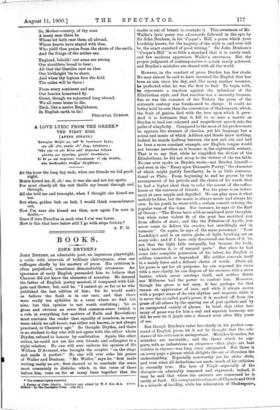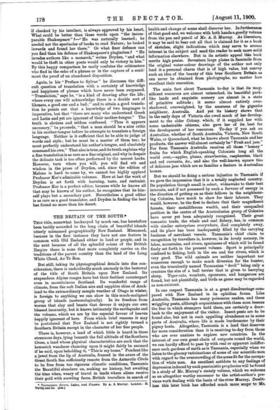BOOKS.
JOHN DRYDEN.f
JOHN DRYDEN, an admirable poet, an ingenious playwright, a critic with intervals of brilliant clairvoyance, wins our suffrages chiefly by his mastery of prose. His criticism is often prejudiced, sometimes demonstrably erroneous. An ignorance of early English persuaded him to believe that Chaucer did not know the elements of scansion. He deemed the father of English poetry musical, if compared with Lid- gate and Gower, but, said he, "I cannot go so far as he who published the last edition of him; for he would make us believe the fault is in our ears, and that there were really ten syllables in a verse where we find but nine, but this opinion is not worth confuting; 'tis so gross and obvious an error that common-sense (which is a rule in everything but matters of Faith and Revelation) must convince the reader that equality of numbers, in every verse which we call heroic, was either not known, or not always practised, in Chaucer's age." So thought Dryden, and there is no student to-day who will not agree with the editor whom Dryden refused to honour by confutation. Again, like other critics, he could not see his own friends and colleagues in a right relation. No one will ever endorse his opinion of Sir William D'Avenant, who brought the couplet "on the stage and made it perfect." No one will ever echo his praise of Waller and Denham. "Mr. Waller," says he, "first made writing easily an art ; first showed us to conclude the sense most commonly in distichs, which, in the verse of those before him, runs on for so many lines together that the
• The mustc.st-rIghts reserved.
t Essays of John Dryden. Selected and edited by W. P. Ker, M.A. 2 vole. Oxford: At the Clarendon Press. [105.6d.] reader is out of breath to overtake it This sweetness of -Mr. Waller's lyric poesy was afterwards followed in the epic by
Sir John Denham, in his Cooper's a poem which your Lordship knows, for the majesty of the style is, and ever will be, the exact standard of good writing." Sir John Denham's "Cooper's Hill" is so little a standard that it is rarely read, and few moderns appreciate Waller's sweetness. But the proper judgment of contemporaries is a task rarely achieved, and Dryden's mistakes are shared with all the world.
However, in the conduct of prose Dryden has few rivals. He may almost be said to have invented the English that has been an aim since his day, and, like many another inventor, he perfected what he was the first to find. To begin with, he represents a reaction against the splendour of • the Elizabethan style, and that reaction was a necessity because, fine as was the romance of the Tudors, the prose of the sixteenth century was foredoomed to change. It could no better hold its own than the convention of Shakespeare, which, the fruit of genius, died with the tree upon which it grew. And it is fortunate that it fell to so sane a master as Dryden to lead our coloured and magnificent speech into the paths of simplicity. Compared to the most of his predecessors he appears the sternest of classics, yet his language has a sound and music of which Addison and Steele knew nothing. Indeed, he stands halfway between the new and old, and had he been a more constant example, our English tongue would not become nerveless as it became in the eighteenth century. That is to say that, while he simplified the diction of the Elizabethans, he did not stoop to the twitter of the tea-table. No one ever spoke as Dryden wrote—not Dryden himself— and even in the "Essay upon Dramatic Poetry," the character of which might justify familiarity, he is as little conversa- tional as Plato. From beginning to end he proves by the arrangement of his periods and the choice of his words that he had a higher ideal than to echo the accent of the coffee- house or the converse of friends. For his prose is an instru- ment at once supple and dignified. He can play upon it what melodyle likes, but the music is always music and always his own. In his youth he wrote with a certain conceit, echoing the popular tune of the time. For instance, he says of the Earl of Orrery: "The Muses have seldom employed your thoughts, but when some violent fit of the gout has snatched you from affairs of state ; and like the Priestess of Apollo, you never come to deliver his oracles, but unwillingly and in torment." Or, again, he says of the same personage : "Your Lordship's soul is an entire globe of light, breaking out on every side; and if I have only discovered one beam of it, 'tie not that the light falls unequally, but because the body, which receives it, is of unequal parts." But when he had come into complete possession of his talent, his English is seldom conceited or bepranked. His artifice conceals itself in a manly force and a delicate choice of words. Above all, his prose is apt for all purposes, he can expound his views with a rare clarity, he can dispose of his enemies with a stern banter, which never outsteps itself, and neither Settle nor Milburne had the power to confute him. Moreover, though his prose is not easy, it has perhaps for that reason an appearance of ease, and while it always moves with a proper sense of its own rhythm and measure, while it is never the so-called poet's prose, it is marked off from the prose of all others by the sparing use of just epithets and by an unexpected variety of phrase. In brief, that other har- mony of prose was for him a real and separate harmony, nor did he ever let it jingle into a discord even after fifty years of use.
• But though Dryden's value lies chiefly in his perfect com- mand of English prose, let it not be thought that the sub- stance of his criticism is unimportant. Mistakes he makes, for mistakes are inevitable ; and the thesis which he sup- ports with so industrious an eloquence—that plays are best written in rhyme—was long since antiquated. But there is on every page a phrase which delights the ear or illumines the understanding. Especially noteworthy are his °biter dicta, and even when all deductions are made, much of his criticism it eternally true. His love of Virgil—especially of the Georgics—is admirably reasoned and expressed; indeed, it may be said that where the ancients are concerned he is rarely at fault. His comparative estimate of Chaucer and Ovid is a miracle of. lucidity, while his admiration of Shakespeare, if checked by his intellect, is always approved by his heart. What could be better than these words upon "the incom- parable Shakespeare" P--" He was naturally learned; he needed not the spectacles of books to read Nature; he looked inwards and found her there." Or what finer defence can you find than his defence of Shakespeare's plagiarism P "He invades authors like a monarch," writes Dryden, "and what would be theft in other poets would only be victory in him." By this happy comparison he easily confutes the critieasters who find in the echo of a phrase or in the capture of a senti- ment the proof of an abandoned disposition.
Again, in his "Preface to Sylvae " he discusses the diffi- cult question of translation with a certainty of knowledge and happiness of phrase which have never been surpassed. "Translation," says he, "is a kind of drawing after the life; where every one will acknowledge there is a double sort of likeness, a good one and a bad ; " and to attain a good transla- tion he points out that a knowledge of two languages is imperative, but that "there are many who understand Greek and Latin and yet are ignorant of their mother-tongue." The truth is obvious and seldom confessed. "Thus it appears necessary," be proceeds, "that a man should be a nice critic in his mother-tongue before he attempts to translate a foreign language. Neither is it sufficient that he be able to judge of words and style; but he must be a master of them too; he must perfectly understand his author's tongue, and absolutely command his own." That also is true, and its truth explains why a fine translation is as rare as a fine original, and why in despair the delicate task is too often performed by the merest hacks. However, turn where you will, you will find wit and wisdom in the prose of Dryden, and, since the edition of Malone is hard to come by, we cannot too highly applaud Professor Ker's admirable volumes. Here at last the work of Dryden is set forth with learning, taste, and restraint. Professor Ker is a perfect editor, because while he knows all that may be known of his author, he recognises that he him- self plays but a secondary part. Nevertheless a good editor is as rare as a good translator, and Dryden in finding the best has found no more than his desert.



































 Previous page
Previous page